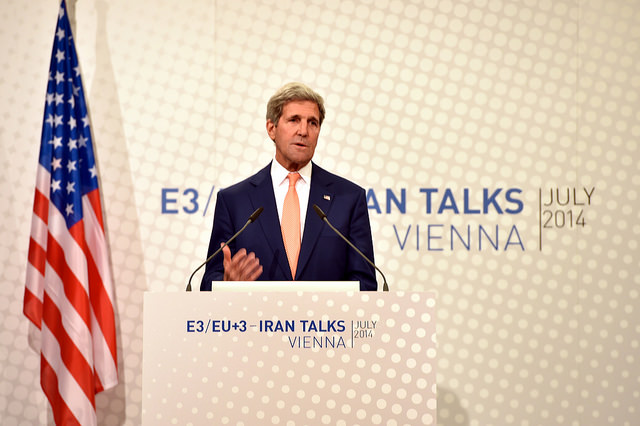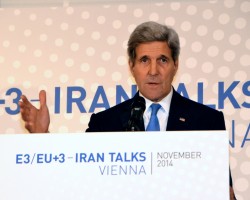Iran Nuclear Talks: Extension Builds on Positive Momentum

Secretary Kerry Addresses Reporters During News Conference Following Iran Nuclear Talks in Vienna, 7/15/2014
On Friday night, P5+1 and Iranian diplomats announced a plan to extend the nuclear negotiations past the July 20 deadline for the Joint Plan of Action that has frozen Iran’s nuclear program in exchange for modest sanctions relief. Under the terms of the extension, Iran’s nuclear enrichment program will remain frozen and it will continue to reduce its stockpile of enriched uranium, converting it into non-weaponizable forms. This will allow negotiators to continue to build on the progress that has been made toward a comprehensive agreement that could ensure Iran’s nuclear program will remain peaceful. The extension is a good deal, and those who have voiced opposition to it fail to understand the issues at hand.
The extension of the Joint Plan of Action is a great deal that preserves the possibility of a diplomatic solution to Iran’s nuclear program.
The terms of the extension obligate Iran to eliminate its stockpile of 20%-enriched uranium in exchange for very modest economic relief. “The six-month halt in all significant advances in Iran’s nuclear program will remain in effect, as will the modest but worthwhile lengthening of the time it would take Iran to produce enough weapons-grade uranium for a single nuclear weapon – the result of the neutralization of Tehran’s entire stockpile of 20 percent enriched uranium gas,” Brookings Institution Senior Fellow Robert Einhorn wrote on Saturday. The terms of the extension will take these reductions even further, with Iran converting its remaining 20%-enriched uranium into reactor fuel, a process that makes it extremely difficult to ever be converted back to a weaponizable form.
As Rep. Lloyd Doggett (D-TX) noted while voicing his support for the extension, “Iran has received just enough sanctions relief to demonstrate the potential benefits of cooperation but not enough to rejuvenate its economy.” In fact, the Obama Administration has said that Iran’s economy has actually underperformed compared to its early estimates for sanctions relief. As a senior administration official told reporters in Vienna, “We estimated the total value of the relief in the Joint Plan of Action would be in the neighborhood of $6 to 7 billion, and I think it has actually come in less than that. Critically, the overwhelming majority of our sanctions, including the key oil, banking, and financial sanctions, all remain in place.” And though Iran will be allowed to access an additional $2.8 billion in previously restricted funds, more than $100 billion will remain off limits. [Robert Einhorn, 7/19/14. Lloyd Doggett, 7/18/14. State Department Briefing, 7/18/14]
The extension gives negotiators time and space to continue working toward an agreement at a critical moment. In announcing the extension, EU High Representative Catherine Ashton and Iranian Foreign Minister Mohammad Javad Zarif noted that the extension “build[s] on the political momentum created by the adoption and smooth implementation by both sides of the Joint Plan of Action” and that the talks have achieved “tangible progress on some of the issues,” though “significant gaps on some core issues…will require more time and effort.” The four-month extension is the best chance to try to bridge those remaining gaps. “With so much at stake and a good deal within reach it makes sense to extend the talks and keep pushing toward an agreement,” said National Security Network Executive Director John Bradshaw. “A few more months is not a lot to ask to achieve an agreement that could have long-term positive impacts by ensuring that Iran does not build nuclear weapons and America does not get sucked into another war in the Middle East.” [Catherine Ashton and Mohammad Javad Zarif, 7/19/14. John Bradshaw, 7/19/14]
The extension of the negotiations has the support of lawmakers who recognize what it will take to reach a good deal. “The P5+1 negotiations with Iran represent our best chance to peacefully ensure Iran does not acquire a nuclear weapon,” Sen. Dianne Feinstein (D-CA) said on Friday. “Clearly there is momentum toward an agreement and we have a responsibility to see it through – as diplomacy must be the preferred course of action.” House Democratic Whip Steny Hoyer (D-MD) said the “agreement to keep negotiating an end to Iran’s nuclear weapons program will permit the Administration to continue its two-track approach to dismantling Iran’s nuclear weapons capability and ensuring robust and aggressive verification of any agreement.” The Congressional Progressive Caucus also voiced support for the extension. “If negotiators need more time to reach a comprehensive agreement, we should support them,” said Rep. Keith Ellison (D-MN). “It is in America’s best interest to continue on the path of diplomacy.” [Dianne Feinstein, 7/18/14. Steny Hoyer, 7/18/14. Keith Ellison, 7/19/14]
Opponents of the extension don’t have a sound understanding of the issues. Sen. Mark Kirk (R-IL) responded to the extension with a video in which he claims that “The administration policy is the quickest policy that leads to war, nuclear war,” going on to say “That is a horrible fate to condemn American children to witness.” Sen. Kirk’s fear-mongering could not be farther from the truth. Under the Joint Plan of Action, the International Atomic Energy Agency has conducted regular inspections and confirmed that Iran is not building a nuclear weapon – and in accordance with the terms of the extension, Iran will convert its weaponizable enriched uranium into reactor fuel that cannot be used in a bomb. The extended Joint Plan of Action will place Iran even further from having the material or means to build a nuclear weapon. Alarmist statements like Sen. Kirk’s simply have no basis in reality. [Mark Kirk, 7/18/14]






![President Barack Obama and President-elect Petro Poroshenko of Ukraine talk after statements to the press following their bilateral meeting at the Warsaw Marriott Hotel in Warsaw, Poland. [Official White House Photo by Pete Souza, 6/4/2014]](/cms/assets/uploads/2014/07/Obama-Ukraine-150x150.jpg)